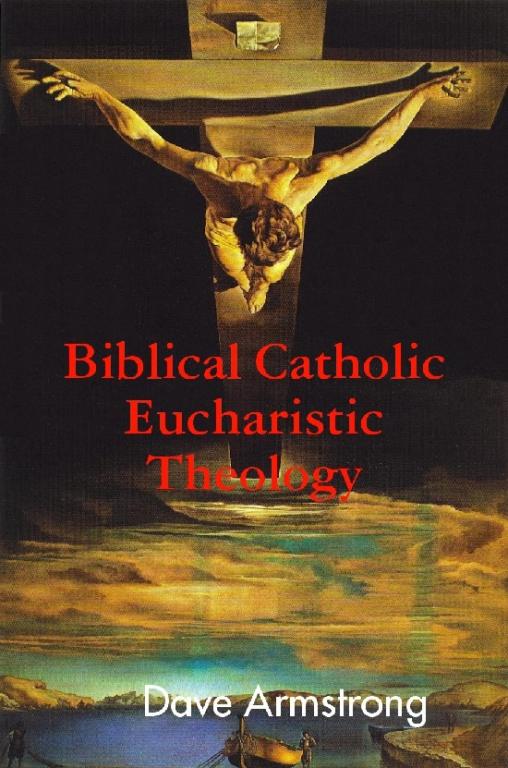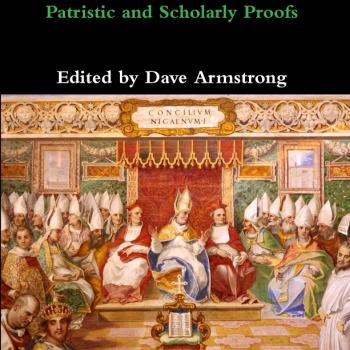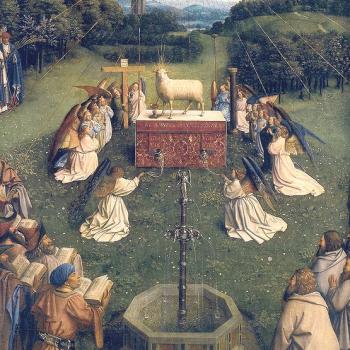Featuring Liturgy and the Sacrifice of the Mass in the Church Fathers

I am replying to the first portion of the video, Why you should be Lutheran INSTEAD of Roman Catholic or Eastern Orthodox (w/ Pr. Will Weedon) [8-9-24], on the YouTube channel of Javier Perdomo: who recently converted to Lutheranism from another form of Protestantism.
William Weedon has served as a parish pastor for 26 years and served as Director of Worship and Chaplain for the Lutheran Church—Missouri Synod from 2012-2019 (a traditional Lutheran communion for which I have a great respect). He is the author of the books Celebrating the Saints, Thank, Praise, Serve and Obey and See My Savior’s Hands. Pastor Weedon holds a Master of Divinity and a Master of Sacred Theology degree from Concordia Seminary, St. Louis.
His words will be in blue.
*****
6:37 you can see why Lutherans would be more inclined toward Orthodoxy maybe than toward Rome. You don’t have indulgences
. . . which has an explicit biblical basis and a history that has often been distorted by Protestants for polemical purposes, or out of sheer lack of knowledge.
you don’t have Purgatory
. . . which has at least 110 Bible passages pointing to, and in complete harmony with essential aspects of it . . .
you don’t have any of the the weird stuff that uh that Lutheran struggled with across across the centuries with with Rome
“Weird” is often in the eye of the beholder and works both ways.
7:28 Orthodoxy has a perfect solution to this . . . the church can’t be wrong and therefore if we’ve been teaching this for any number of years it’s got to be the truth of God and you just need to learn to submit to that; you know that’s the way to go
The indefectibility of the Church is biblical teaching. See also:
1 Timothy 3:15 = Church Infallibility (vs. Steve Hays) [5-14-20]
So is apostolic succession:
Biblical Arguments for Apostolic Succession [9-9-09]
Apostolic Succession: More Biblical Arguments [1-6-17]
Apostolic Succession as Seen in the Jerusalem Council [National Catholic Register, 1-15-17]
Answers to Questions About Apostolic Succession [National Catholic Register, 7-25-20]
A New Biblical Argument for Apostolic Succession [National Catholic Register, 4-23-21]
“New” Apostle Matthias: Proof of Church Infallibility [12-31-21]
Lutherans are bound to the teachings of their own confessions: compiled in the Book of Concord. It’s not that different. But Orthodoxy and Catholicism can trace themselves back to the early Church and Jesus Christ, whereas Lutheranism only goes back to Martin Luther in the 16th century. Our views are both more coherent and consistent. Lutheranism tries to establish itself as uniquely consistent with patristic teachings, but fails every time, excepting cases where it already agrees with Catholicism or Orthodoxy (e.g., regarding baptismal regeneration or the Real Presence in the Holy Eucharist). I’ve documented this many times in my own research.
7:44 but what do you do with Mary?
You do what Martin Luther did (assuming he was a good, orthodox Lutheran). He believed that she was a perpetual virgin (even during birth: i.e., a miraculous in partu birth), and held to a form of her Immaculate Conception, and believed in her Assumption, and that she was the Mother of God the Son (Theotokos), and in venerating her, within certain definite limits.
8:02 He cites a typical “flowery” Marian prayer from the Orthodox. I have dealt with this many times, in terms of similar Catholic language of veneration and intercession:
St. Alphonsus de Liguori: Mary-Worshiper & Idolater? [8-9-02]
Was St. Louis de Montfort a Blasphemous Mariolater? (cf. abridged, National Catholic Register version) [2009]
Maximilian Kolbe’s “Flowery” Marian Veneration & the Bible [2010]
8:51 they’ll always say, “hey we ask fellow Christians here on earth to pray for us.” I don’t ask a fellow Christian here on earth to grant me tears of repentance
We obviously ask other believers to pray to God that we would be granted tears of repentance by God’s grace. It’s the same with Mary, just on a larger scale, because she was so honored by God to be the mother of Jesus.
8:56 I don’t ask them to to grant me mercy . . . I just can’t square [that] with the Bible
Then why did the rich man in Hades, say, “Father Abraham, have mercy upon me, and send Lazarus to dip the end of his finger in water and cool my tongue; for I am in anguish in this flame” (Lk 16:24, RSV)? That was recounted in a story (not a parable) by Jesus Himself. The rich man petitioned Abraham in three different ways. Abraham never told him that he mustn’t do so; only that the answer to his requests was no: just as God sometimes doesn’t answer our prayers. Then we are told that this is merely a parable. Even if it were, Jesus couldn’t teach theological falsehood in it. Or we’re told that this doesn’t “count” because it’s after death. That’s irrelevant, too, because if it is intrinsically impermissible to make petitions of anyone besides God, that would hold in Hades as well as on earth, and Jesus couldn’t and wouldn’t affirm the practice.
13:29 you cannot start reading the early church fathers before you encounter what a big deal the mass or The Divine Liturgy [is]: what we Lutherans often call the common service or the Divine service. It confronts you all over the place, right away. It’s there already [in] 150 AD. Read St Justin Martyr’s first apology and you you can clearly recognize, “that’s the same service we use.”
Lutherans thankfully retain the Real Presence in the Holy Eucharist (though not transubstantiation), but they ditched the belief in the eucharistic sacrifice of the Mass, which the Church fathers believed in. So they aren’t following the fathers with regard to the essence of the Mass: that Jesus’ one-time sacrifice on the cross is made supernaturally present to us. See:
Transubstantiation & Church History: Dialogue w Lutheran [2-12-05; abridged on 10-23-18]
Eucharistic Sacrifice: The Witness of the Church Fathers [9-12-05]
Sacrifice of the Mass: Reflections on Theology & Patristics [9-22-05]
Development of Sacrifice of the Mass: Dialogue w Lutheran [9-22-05]
Sacrifice of the Mass / Cyprian’s Ecclesiology (vs. Calvin #11) [5-19-09]
Church Fathers and the Sacrifice of the Mass (Thoroughly Catholic!) [12-11-09]
Justin Martyr, Real Presence, & Eucharistic Sacrifice (vs. Lucas Banzoli) [9-13-22]
Tertullian’s Eucharistic Theology: Lucas Banzoli vs. J.N.D. Kelly [9-15-22]
“Please Hit ‘Subscribe’”! If you have received benefit from this or any of my other 4,900+ articles, please follow my blog by signing up (with your email address) on the sidebar to the right (you may have to scroll down a bit), above where there is an icon bar, “Sign Me Up!”: to receive notice when I post a new blog article. This is the equivalent of subscribing to a YouTube channel. My blog was rated #1 for Christian sites by leading AI tool, ChatGPT: endorsed by influential Protestant blogger Adrian Warnock. Actually, I partner with Kenny Burchard on the YouTube channel, Catholic Bible Highlights. Please subscribe there, too! Please also consider following me on Twitter / X and purchasing one or more of my 55 books. All of this helps me get more exposure, and (however little!) more income for my full-time apologetics work. Thanks so much and happy reading!
***
Pr. Weedon brought up St. Justin Martyr. Was he a good proto-Lutheran? Hardly. J. N. D. Kelly is a very well-known Anglican church historian. Here’s what he believes about Justin’s views:
Justin speaks [Dialogue with Trypho, 117, 1] of ‘all the sacrifices in this name which Jesus appointed to be performed, viz. in the eucharist of the bread and the cup, . . .’. Not only here but elsewhere [Ib., 41, 3] too, he identifies ‘ the bread of the eucharist, and the cup likewise of the eucharist’, with the sacrifice foretold by Malachi. (Early Christian Doctrines, HarperSanFrancisco, revised edition of 1978, p. 196)
Here are the two passages from St. Justin Martyr referred to:
Accordingly, God, anticipating all the sacrifices which we offer through this name, and which Jesus the Christ enjoined us to offer, i.e., in the Eucharist of the bread and the cup, and which are presented by Christians in all places throughout the world, bears witness that they are well-pleasing to Him. But He utterly rejects those presented by you and by those priests of yours, saying, ‘And I will not accept your sacrifices at your hands; for from the rising of the sun to its setting my name is glorified among the Gentiles (He says); but you profane it.’ Malachi 1:10-12 (Dialogue with Trypho, 117, 1)
Hence God speaks by the mouth of Malachi, one of the twelve [prophets], as I said before, about the sacrifices at that time presented by you: ‘I have no pleasure in you, says the Lord; and I will not accept your sacrifices at your hands: for, from the rising of the sun unto the going down of the same, My name has been glorified among the Gentiles, and in every place incense is offered to My name, and a pure offering: for My name is great among the Gentiles, says the Lord: but you profane it.’ Malachi 1:10-12 [So] He then speaks of those Gentiles, namely us, who in every place offer sacrifices to Him, i.e., the bread of the Eucharist, and also the cup of the Eucharist, affirming both that we glorify His name, and that you profane [it]. (Dialogue with Trypho, 41, 3)
Kelly continues his lengthy commentary on Justin’s views:
It was natural for early Christians to think of the eucharist as a sacrifice. The fulfilment of prophecy demanded a solemn Christian offering, and the rite itself was wrapped in the sacrificial atmosphere with which our Lord invested the Last Supper. The words of institution, ‘Do this’, must have been charged with sacrificial overtones for second-century ears; Justin at any rate understood [1 apol. 66, 3; cf. dial. 41, 1] them to mean, ‘Offer this’. . . . Justin . . . makes it plain [Dial. 41, 3] that the bread and wine themselves were the ‘pure offering’ foretold by Malachi. Even if he holds [Ib., 117, 2] that ‘prayers and thanksgivings’ are the only God-pleasing sacrifices, we must remember that he uses [1 apol. 65, 3-5] the term ‘thanksgiving’ as technically equivalent to ‘the eucharistized bread and wine’. The bread and wine, moreover, are offered ‘for a memorial of the passion’, a phrase which in view of his identification of them with the Lord’s body and blood implies much more than an act of purely spiritual recollection. Altogether it would seem that, while his language is not fully explicit, Justin is feeling his way to the conception of the eucharist as the offering of the Saviour’s passion. (Kelly, ibid., pp. 196-197)
F. L. Cross and E. A. Livingstone, editors, The Oxford Dictionary of the Christian Church, Oxford Univ. Press, 2nd edition, 1983, 475-476, 1221, wrote:
It was also widely held from the first that the Eucharist is in some sense a sacrifice, though here again definition was gradual. The suggestion of sacrifice is contained in much of the NT language . . . the words of institution, ‘covenant,’ ‘memorial,’ ‘poured out,’ all have sacrificial associations. In early post-NT times the constant repudiation of carnal sacrifice and emphasis on life and prayer at Christian worship did not hinder the Eucharist from being described as a sacrifice from the first . . .
From early times the Eucharistic offering was called a sacrifice in virtue of its immediate relation to the sacrifice of Christ.
Jaroslav Pelikan [Lutheran at the time of this writing, and later Orthodox], The Emergence of the Catholic Tradition (100-600), Chicago: Univ. of Chicago Press, 1971, 146-147, 166-168, 170, 236-237:
By the date of the Didache [anywhere from about 60 to 160, depending on the scholar]. . . the application of the term ‘sacrifice’ to the Eucharist seems to have been quite natural, together with the identification of the Christian Eucharist as the ‘pure offering’ commanded in Malachi 1:11 . . .
The Christian liturgies were already using similar language about the offering of the prayers, the gifts, and the lives of the worshipers, and probably also about the offering of the sacrifice of the Mass, so that the sacrificial interpretation of the death of Christ never lacked a liturgical frame of reference . . .
. . . it does seem ‘express and clear’ that no orthodox father of the second or third century of whom we have record declared the presence of the body and blood of Christ in the Eucharist to be no more than symbolic (although Clement and Origen came close to doing so) or specified a process of substantial change by which the presence was effected (although Ignatius and Justin came close to doing so). Within the limits of those excluded extremes was the doctrine of the real presence . . .
Liturgical evidence suggests an understanding of the Eucharist as a sacrifice, whose relation to the sacrifices of the Old Testament was one of archetype to type, and whose relation to the sacrifice of Calvary was one of ‘re-presentation,’ just as the bread of the Eucharist ‘re-presented’ the body of Christ . . .
As John Adams once said, “Facts are stubborn things; and whatever may be our wishes, our inclinations, or the dictates of our passion, they cannot alter the state of facts and evidence.”
15:23 our Lutheran liturgy really is overwhelmingly the same heritage
It’s not, because it denies the very essence of the Mass: the eucharistic sacrifice.
15:28 Luther and the reformers were anything but revolutionaries on this question
Really? In 1525, Luther wrote his treatise, The Abomination of the Secret Mass (found in Luther’s Works, vol. 36, pp. 311-328). In it he calls the Catholic Mass “disgraceful,” “abominable,” “idolatries” (all on p. 311), “shameful,” “plague,” “deliberate blasphemies” (p. 312), “insults God,” “they deny God and insult the sacrifice that Christ has made and disgrace his blood” (p. 313), “the blasphemy is so great that it must simply wait for eternal hell-fire” (p. 320), etc. ad nauseam.
All through the diatribe he shows himself perfectly ignorant of the fact that we hold that it is a supernatural re-presentation of the one true Sacrifice on Calvary, not a repeated sacrifice (e.g., “they . . . offer him up more than a hundred thousand times throughout the world. They thereby deny . . . that Christ . . . has died and risen again”: p. 320). This is elementary, and was explained long since in the Church fathers. But once Luther got on his soap box, mere things like accuracy and fairness to opponents always quickly went by the wayside.
But he was undeniably a liturgical revolutionary because he “gutted” the Mass of its most essential element. In no way can he be viewed as consistently following the liturgical understanding of the Church fathers.
15:34 they kept whatever they could from the ancient tradition that was not contrary to the Bible
Ah, so now it’s at least qualified.
16:28 our churches are falsely accused of abolishing the mass
The problem is that if one omits what is essential and “non-negotiable” / “non-optional” in an ancient view, one can’t be said to be continuing the same ancient view, or call it their “heritage.” It’s a basic question of both fact and logical consistency. Catholicism and Orthodoxy continue what the fathers believed about liturgy. Lutheranism does not, nor does any form of Protestantism, save for possibly a few Anglo-Catholics.
17:29 in a Lutheran Church . . . the historic liturgy is being used
It certainly is not, with all due respect. It’s “historic” only back to Luther’s time. The Church fathers wouldn’t recognize it. They would say it is gutted, as we do.
The Council of Trent, in its Doctrine on the Sacrifice of the Mass (September 17, 1562), explains why we do:
He offered up to God the Father His own Body and Blood under the species of bread and wine . . . and by those words, “Do this in commemoration of me” (1 Cor. 11:24), He commanded them and their successors in the priesthood to offer them . . .
And this is indeed that clean oblation, which cannot be defiled by any unworthiness or malice of those that offer it; which the Lord foretold by Malachi was to be offered in every place, clean to his name (Mal. 1:11) . . . This, in fine, is that oblation which was prefigured by various types of sacrifices (Gen. 4:4; 8:20, etc.), during the period of nature and of the law; inasmuch as it comprises all the good things signified by those sacrifices, as being the consummation and perfection of them all.
We’re following the example of Our Lord at the Last Supper, as set down in inspired revelation. For more on this, see;
The Sacrifice of the Mass: A Lamb . . . Slain [3-8-92; rev. May 1996]
The Sacrifice of the Mass: Classic Catholic Reflections [1994]
Sacrifice of the Mass & Hebrews 8 (vs. James White) [3-31-04]
The Timeless Crucifixion & the Sacrifice of the Mass [9-25-09]
Is Jesus “Re-Sacrificed” at Every Mass? [National Catholic Register, 8-19-17]
39:05 this sacrifice once offered on the cross takes place continually in an unseen fashion in heaven
Catholics believe that in the Mass we are supernaturally included in this offering.
39:11 by way of commemoration when Christ offers to his father on our behalf his suffering
It’s not merely commemoration if we are supernaturally transported back to Calvary and Jesus’ suffering and death on the cross. In Revelation 5:6, St. John saw Jesus in a way that is very much like the Sacrifice of the Mass: “I saw a Lamb standing, as though it had been slain.” Yet in 5:9 and 5:12 the text notes that Jesus “wast slain” and “was slain.” And we all know that Jesus rose from the dead and was resurrected. So the Bible teaches that there is a quality of the Mass and Jesus’ one-time sacrifice that transcends time. “Lamb” referring to Jesus occurs 28 times in the book of Revelation in RSV.
39:23 this is the unbloody sacrifice which is carried out in heaven
But it’s not unbloody because it is the one sacrifice that occurred in time in Jerusalem, and this is more or less proven by Revelation 5:6. At the very least, that passage is perfectly consistent with what we say about the Mass: especially since it occurs in the context of a massive worship service in heaven.
39:37 If we view the matter from the material standpoint the sacrifice in the Eucharist is numerically the same as the sacrifice that took place on the cross
Exactly! Now if Lutherans could only figure out that we agree on this point!
44:13 when we read the fathers, number one, we don’t burden them with infallibility. There’s going to be stuff in the fathers that they get wrong and we know that . . . the fathers are not the inspired and inherent scriptures
So do we. We don’t believe that the Church fathers collectively or individually are infallible. We think the Church and the pope are granted that gift, in carefully specified circumstances. What we look to is patristic consensus on issues, which we believe indicates or exhibits the scope and nature of the apostolic tradition that was passed down. We don’t even hold that St. Augustine and St. Thomas Aquinas were infallible.
*
Practical Matters: I run the most comprehensive “one-stop” Catholic apologetics site: rated #1 for Christian sites by leading AI tool, ChatGPT — endorsed by popular Protestant blogger Adrian Warnock. Perhaps some of my 4,900+ free online articles or fifty-five books have helped you (by God’s grace) to decide to become Catholic or to return to the Church, or better understand some doctrines and why we believe them.
*
***
*
Photo credit: cover of my self-published 2011 book [see book and purchase information]
I critique Luther pastor Will Weedon’s rationale for remaining Lutheran, over against Catholicism. Highlights include the Sacrifice of the Mass and the Church fathers.













